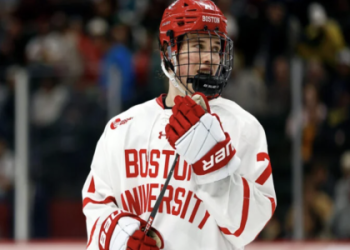In a thrilling display at the Sandwich High Hockey rink, the team fought valiantly but ultimately fell short against their rivals, leaving players and fans alike craving improvement for future matches. As the final buzzer sounded, the palpable disappointment was evident. However, underlying their loss were lessons to be learned and strategies to be refined that could substantially boost team performance moving forward.
During the game, Sandwich High struggled to maintain possession and execution under pressure. The opposing team’s defensive strategy pressed hard, leading to turnovers that changed the game’s momentum. Captain Jake Thompson noted, “We had moments where we played well, but mistakes crept in at crucial times. If we can learn from those, we can definitely improve.” Such insights from players reflect a broader understanding of their challenges and a desire to adapt.
Key players like goalie Alex Smith faced numerous shots on goal, showcasing an impressive reflex but ultimately conceding a few critical goals. After the game, Alex shared, “Every shot is a chance to learn. I know I can be better, and I’ll take this to heart.” His motivation is essential as goalkeeping is pivotal in hockey, where the margin between victory and defeat can be razor-thin. Furthermore, feedback from Alex’s teammates can help in establishing better defensive schemes during practice.
Looking back at their season, Sandwich High has proven they can be competitive. However, the lack of consistency has often held them back. Several players have shown promise, like forward Ethan Lewis, who managed to score a goal despite the loss. “Every game is a building block,” he remarked. “We just need to figure out how to turn those close games into wins.” This persistence reflects the determined spirit within the team.
Moreover, the coaching staff plays a crucial role in developing strategies. Coach Sarah Wilson emphasized the need to focus on communication during games. “We need to talk more on the ice,” she explained. “Clear communication often leads to better teamwork. Our set plays need to be practiced until they become second nature.” This echoes what many analysts suggest: effective communication can dramatically enhance team synergy.
Adjusting practices to incorporate situational drills could also benefit the team. For instance, focusing on power plays and penalty kills during training sessions would prepare the players for game-time scenarios. As noted by a sports performance specialist, “Repetition is key—making sure players have the chance to practice under pressure can make all the difference.”
The home rink conditions must also be considered. Every arena has its quirks, influencing puck speed and player movements. Familiarizing themselves with their home ice will undoubtedly provide an advantage. Veteran players often emphasize this aspect, stating, “Knowing every corner, divot, and bump makes a big difference during games.” It’s a factor that Sandwich High players can exploit to their benefit.
Furthermore, building a strong team culture could lead to improved performance. Organizing team bonding events off the ice aids in fostering trust and camaraderie among players. According to Ethan Lewis, “We’ve got great potential, but it’s essential we gel together as a team outside of these games too.” A unified team spirit often translates to better collaboration during matches.
In summation, while the Sandwich High hockey team may have encountered setbacks in their recent match, the pathways to improvement are clear. By focusing on communication, reinforcing practice drills, and enhancing team dynamics, they can turn their performance around. Each player seems committed, demonstrating a resolve to come back stronger.
As this hockey season unfolds, one thing remains certain: the journey of growth and adaptation defines them. Fans are left with a question: what aspect of the game do you believe is most crucial for the Sandwich High team to focus on in order to elevate their performance? Your insights could inspire future strategies!















